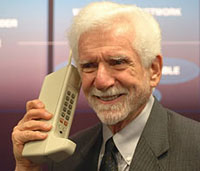
Not long ago we lived in a society where cell phones were, for the most part, nonexistent. If you had a cell you looked like an idiot because it looked something like the picture to the right. Such bulky devices had practically no features--they couldn't take pictures, record your voice, text message, play games, display information, surf the net, or do anything except call people. Not long ago there weren't any computers like we have today. Any computers that existed were owned by the government and personal computers had barely even come into the market--those in the market could do little more than a standard scientific calculator can do today. We didn't
 have electric cars or hybrids, at least not as an economic option. Space travel wasn't being turned into a private enterprise by companies like Virgin Galactic, etc. and medical research was a long way off from growing a functioning ear on the back of a mouse.
have electric cars or hybrids, at least not as an economic option. Space travel wasn't being turned into a private enterprise by companies like Virgin Galactic, etc. and medical research was a long way off from growing a functioning ear on the back of a mouse.But today we have all these things. So much of what science fiction writers predicted would happen at some point in the future, even if their dates were wrong, has happened. To some it is as if we live in a science fictional world--I'm sure if we went back in time and showed Asimov what the world of today is like he would agree.
This is a hurdle, a miniature battle for science fiction. What value does SF have in a world that is rapidly advancing to the point where many of the things that once were SF are now reality? Does science fiction still have something to say?
You damn well better believe it! Science fiction has plenty to say about the future, the world, heck even the universe! So long as some people with crazy brains can think about things that haven't happened yet, SF will exist. Certainly there might come a time when a lot of SF isn't
What will science fiction have to say? Science fiction can talk about the environment, it can talk about what might be the future of a political decision, or the future of a new, advanced cell phone that has a built in AI, or a myriad of other things. Even if technology becomes dull because it's 'everywhere', SF can still discuss societal changes and future issues of human rights, the evolution of 'race', the power of technology and its influence, etc. SF is a treasure trove, a giant metaphorical idea box where everyone can submit suggestions. Some of them will be heard and some of them will not. We might be living in a time where SF seems to be losing a little ground against the more escapist fantasy--I love fantasy too--but it still has value and importance because only science fiction can discuss the things that are more pressing in our future. Only science fiction can tell us what to expect.
Science fiction is the future.


I've read some claims - by science fiction writers, no less - that "the future is here", and it strikes me as a real failure in imagination. Sure we live in a science fictional world from the perspective of the 1940s, just as the people who lived in the 1940s lived in a "futuristic" world compared to the 1880s. Has the world stopped changing, technologically or otherwise? Of course not. But the Golden Age technologies are rapidly becoming obsolete, so SF writers have to learn about the environment, and biotech, and nanotech, and AI to look to the future, and I suspect that some of them just aren't up to that.
ReplyDeleteAnd we still aren't living off of Earth, let alone among the stars. That's still a SF future for the human race.
Science Fiction to me is always thinking outside the box. Yes, it means having an imagination as pointed out.
ReplyDeleteAs we continue to grow, so do our children as it's been that way since the dawn of time. I'm in the Generation X decade where the future seems here. To Generation Y, there's so much more to dream since all they know is technology.
I'm a believer that SF will never be lost.